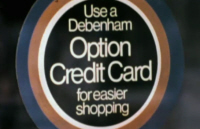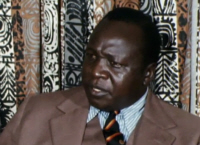Credit Nation
Buy Today, Worry Tomorrow.

Ubiquitous Credit Card
After 25 years of wanting more, ordinary families were now tightening their belts and settling for less. But it was too easy
to blame the Arabs for the Oil Price hike, because in many ways, the Great Inflation was also made in Britain.
By the early 1970s, shopping habits had been transformed and at the heart of the change was a very simple idea – credit.
Advertising "With an Access card, you can buy all kinds of things simply by signing. Suppose you buy a TV set for £79, you
can either pay the whole sum at the end of the month or you can pay the minimum, in this case three pounds, and pay the rest
when you want to."

Store Card
There is something rather sweet about an advert that has to explain how to use a credit card. But we lost our innocence soon
enough. And by 1973, the great plastic boom was on.
News report "Today, the 3.5 million people who received an Access credit cards through the post can start off on a cash-less
spending spree of up to £350 million."
At the root of the credit explosion wasn't just profligate self-indulgence. The truth is people's expectations had outrun their
incomes. A great gulf was opening up between what you earned and what you wanted. And for people who'd got used to the idea of
owning their own home, driving their own car, even going on their first foreign holiday, the answer was simple – borrow now,
pay later.
Pay up and be happy. This was the mantra of the 70s consumerism.

Anthony Batber
The truth is that in the 1970s, everybody wanted everything. This was the era in which what you bought was beginning to define
who you were. Britain was falling in love with mass consumerism. The strained suburbanites of Abigail's Party are wicked caricatures,
but in their spending on something special for the lounge, they were typical of ordinary families across the land.
But like our illusions of Empire, Britain's new spending power was a hollow sham. After unleashing the biggest boom in history,
the Chancellor, Anthony Barber finally yielded to reason. Desperate to control inflation, he restricted credit and announced
savage cuts in public spending. Britain was in an economic nightmare.

Idi Amin
But now came and generous offer of help, and a bracing dose of the truth, from a rather surprising source.
Idi Amin "There is no food in Britain, there is no tea and they have no meat and milk. We have to give
them bananas. We have so many tonnes of bananas."
For Idi Amin, Ugandan dictator and all-round rabble-rouser, the plight of Africa's old colonial master was too good a
chance to resist.
Idi Amin "British now is in chaos completely."
These are some of the telegrams that Idi Amin sent, personally, to Ted Heath. And they make extraordinary reading. This is
the first one, 14 December 1973. "In the past few months, Amin says the people of Uganda have been following with sorrow
the alarming economic crisis in Britain. But there is a solution because I have decided to contribute 10,000 Ugandan shillings
from my personal savings. And I'm convinced that many Ugandans will donate generously to this Save Britain Fund."
For two centuries, Britain had been number one. Thanks to the Empire, British goods, British ideas, British culture, even
British sport, had penetrated every corner of the world. But now the Empire had gone and the world no longer cared.




